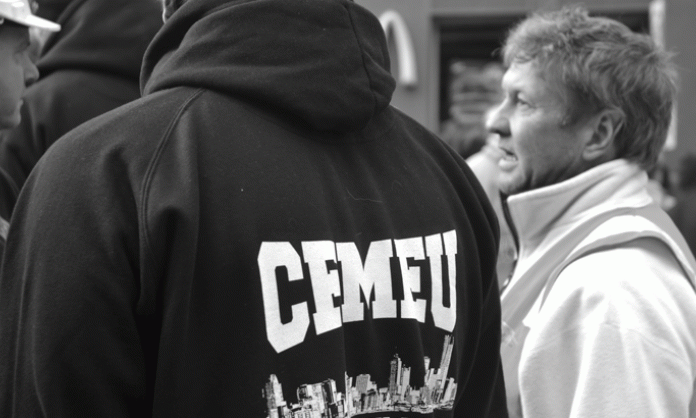The Abbott government is stepping up its attacks on workers and our unions. In parliament, in the courts, in the media, through a string of inquiries and in some of the key workplaces across the country, our unions are under enormous pressure.
How we respond to this challenge will decide a lot about Australian society for years to come. Historically, union strength has been central to winning social protections including medical care, democratic rights and environmental protections as well as decent wages and conditions.
All of these have been under attack for years, and are under further threat from the Liberals, who are instituting serious attacks on our union rights.
At the same time, the government has stepped up attempts to recruit employers for a frontal assault on organised workers’ wages and conditions. Employment minister Eric Abetz has criticised the “weak kneed” approach of some employers, and confirmed to the Wall Street Journal that he discussed a tougher industrial approach with a number of major employers on resource development projects.
For any business wanting government assistance, the asking price is an assault on workers. Some bosses, including Qantas chief executive Alan Joyce, sense an opportunity.
Other companies have been more reserved about signing up for full scale industrial confrontation – at least until down the track, when legal changes make victory more certain.
In mid-February, Fairfax newspapers reported that, during discussions of a possible subsidy to the company, the government had demanded that SPC management slash wages of production workers back to the legal minimum in the award.
This would have cut an average production workers’ wage from around $900 per week (before tax) to a little over $600. The company shied away from this, though it did announce the outsourcing of 73 jobs in maintenance in a failed effort to win federal assistance.
SPC is a clear illustration of what Abbott has in mind for the wages and conditions of large sections of the workforce. But to achieve his goal, the unions will need to be further weakened.
One means to this end is a dramatic increase in legal attacks, especially in the construction industry. In late February, 76 construction workers in Perth were summonsed on two counts each of taking unlawful industrial action. The workers had stopped work to attend a union rally over jobs and apprenticeships in February last year.
For being part of a union rally on a political issue, they now face fines of up to $10,200. The charges are being laid by veteran anti-union operative Nigel Hadgkiss, the newly installed head of the Fair Work Building Commission.
Large fines against unions, officials and, in an increasing number of cases, individual workers, have been a growing trend over the past decade. But this case is the first time that rank and file workers have been targeted for taking part in a city-wide stoppage for a rally.
This is one of several serious attacks on the ability of unions to exercise political rights. This includes restrictions on union spending in Queensland, the attack on the right to protest and picket in Victoria and the police raid on the Unions NT headquarters in Darwin.
Add to this the ongoing propaganda offensive. For most of the next year, the royal commission into the unions will give a forum for every two bit grubby employer to get up and slander the unions.
There are significant fines against the Victorian CFMEU over the two-week picket at the major non-union company Grocon in 2012. The construction unions are also facing a string of prosecutions over a successful nine-week strike that won site rates at the Queensland Children’s Hospital job in 2012.
There are only limited prospects of a legal avenue to fend off these potentially crippling fines. If we want to avoid total surrender (the option advocated by Australian Workers Union secretary Paul Howes), we need a serious industrial fight, similar to the rolling general strike that smashed the anti-union “penal powers” laws in Australia in 1969.
The government’s campaign against the unions is designed to make this sort of resistance unthinkable. Thirty years of sustained assault, and retreat and defeat on our side, mean the Liberals can smell blood.
But the hesitation of some in the ruling class is recognition that our unions still have strength. It’s a potential we saw a decade ago, when the largest workers’ demonstrations in Australian history took place in protest at the previous Liberal government’s WorkChoices laws.
The struggle was sold short, being steered into a purely electoral campaign. But still, organised workers have potential power. We have the ability to stop the flow of profits, and the “business as usual” of the whole system.
Stopping Abbott’s agenda, on workers’ rights and elsewhere, will depend on our side using that power again.
Liberals’ attacks explained
Penalty rates are the Coalition’s number one target in terms of workers’ wages and conditions. The government wants to allow penalty payments to be traded for increased “flexibility”.
This is clearly a step in the direction of the former WorkChoices laws, which allowed employers to offer cut-price contracts as a condition of employment.
It is only one of a raft of amendments to the Fair Work Act. The government agenda includes restrictions on “allowable matters”. The intention is to stop unions from bargaining over issues such as outsourcing, which around the world has been one of the most common legal devices used by bosses to reduce wages and conditions.
The government is also moving to further restrict union right of entry by barring officials’ access to sites without active enterprise agreements.
Australia has much tighter restrictions on industrial action than Thatcher’s Britain ever did. The Coalition wants to tighten this regime further. Coalition policy would make it illegal for unions to strike except where there have been “meaningful” negotiations with the boss. Since they also want to allow any boss to refuse to negotiate, this will make it even more difficult to have a legal strike.
The Coalition also wants to amend the law governing “greenfields sites” to something close to the former WorkChoices regime, which enabled bosses to dictate terms anytime they moved their workplace.
These legal changes represent dramatic attacks on our unions. But they are only the warm-up for a full scale Productivity Commission inquiry into revamping the Fair Work Act.
The Abbott government is also leading by example as an employer: the Canberra Times has reported leaks that 160,000 government workers “will face a choice of zero pay rises for three years or deep cuts to their entitlements”.









